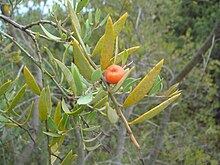Osyris lanceolata
| Osyris lanceolata | |
|---|---|
 | |
| Foliage and fruit | |
| Scientific classification | |
| Kingdom: | Plantae |
| Clade: | Tracheophytes |
| Clade: | Angiosperms |
| Clade: | Eudicots |
| Order: | Santalales |
| Family: | Santalaceae |
| Genus: | Osyris |
| Species: | O. lanceolata |
| Binomial name | |
| Osyris lanceolata | |
| Synonyms[2] | |
| |
Osyris lanceolata, also known as African sandalwood, watta bush or Camwood, is used for its scented wood and to extract essential oil. The semi-parasitic plant is found from South Africa to Zimbabwe and east Africa, including Tanzania, Kenya and Uganda; northwest Africa; the Canary Islands and the southern half of the Iberian Peninsula.[3] It grows in rocky areas or along the margins of dry forest, but is usually not abundant in any one place.
The wood is overexploited in parts of its range despite legal protection.[4] In Somaliland, the leaves and tender branches of the tree are used for tanning leather.[5]
References
[edit]- ^ Wilson, B. (2018). Osyris lanceolata. The IUCN Red List of Threatened Species 2018: e.T200642A2675362. https://dx.doi.org/10.2305/IUCN.UK.2018-1.RLTS.T200642A2675362.en. Downloaded on 5 August 2018.
- ^ "Osyris lanceolata Hochst. & Steud". Plants of the World Online. The Trustees of the Royal Botanic Gardens, Kew. n.d. Retrieved 24 December 2024.
- ^ "Osyris lanceolata" (PDF). Flora Iberica. Retrieved 3 March 2021.
- ^ William Omondi Oloo. "A very useful plant, Osyris lanceolata, is at risk of extinction due to overexploitation". Kew News. Kew Botanical Gardens. Retrieved 14 December 2012.
- ^ RSA (1915). "Nigerian and Somaliland Leather". Journal of the Royal Society of Arts. 63 (3257): 581–582. JSTOR 41346453.
External links
[edit] Media related to Osyris lanceolata at Wikimedia Commons
Media related to Osyris lanceolata at Wikimedia Commons- Santalaceae Osyris lanceolata Hochst. & Steud. IPNI. 2 July 2003. Retrieved 6 August 2007.
- Osyris lanceolata Hochst. & Steud. ex A. DC., Flora of Zimbabwe


 French
French Deutsch
Deutsch